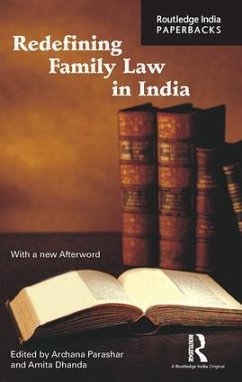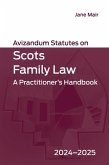Redefining Family Law in India
Herausgeber: Parashar, Archana; Dhanda, Amita
Redefining Family Law in India
Herausgeber: Parashar, Archana; Dhanda, Amita
- Broschiertes Buch
- Merkliste
- Auf die Merkliste
- Bewerten Bewerten
- Teilen
- Produkt teilen
- Produkterinnerung
- Produkterinnerung
'Family Law' refers to the set of legal rules which are in practice in India with regards to 'family' issues - marriage, divorce, inheritance, etc. This volume is a collection of articles by different scholars across disciplines to generate a discourse on just Family Law.
Andere Kunden interessierten sich auch für
![Family Law and Family Realities Family Law and Family Realities]() Family Law and Family Realities131,99 €
Family Law and Family Realities131,99 €![The Future of Child and Family Law The Future of Child and Family Law]() The Future of Child and Family Law57,99 €
The Future of Child and Family Law57,99 €![Putting Children's Interests First in U.S. Family Law and Policy Putting Children's Interests First in U.S. Family Law and Policy]() Helen M. AlvaréPutting Children's Interests First in U.S. Family Law and Policy31,99 €
Helen M. AlvaréPutting Children's Interests First in U.S. Family Law and Policy31,99 €![Avizandum Statutes on Scots Family Law Avizandum Statutes on Scots Family Law]() Avizandum Statutes on Scots Family Law137,99 €
Avizandum Statutes on Scots Family Law137,99 €![A Practical Guide to Advocacy in Family Proceedings A Practical Guide to Advocacy in Family Proceedings]() Stuart BarlowA Practical Guide to Advocacy in Family Proceedings47,99 €
Stuart BarlowA Practical Guide to Advocacy in Family Proceedings47,99 €![A Practical Guide to Working with Litigants in Person and McKenzie Friends in Family Cases A Practical Guide to Working with Litigants in Person and McKenzie Friends in Family Cases]() Stuart BarlowA Practical Guide to Working with Litigants in Person and McKenzie Friends in Family Cases32,99 €
Stuart BarlowA Practical Guide to Working with Litigants in Person and McKenzie Friends in Family Cases32,99 €![Family Law Family Law]() Dayne DanteFamily Law49,99 €
Dayne DanteFamily Law49,99 €-
-
-
'Family Law' refers to the set of legal rules which are in practice in India with regards to 'family' issues - marriage, divorce, inheritance, etc. This volume is a collection of articles by different scholars across disciplines to generate a discourse on just Family Law.
Hinweis: Dieser Artikel kann nur an eine deutsche Lieferadresse ausgeliefert werden.
Hinweis: Dieser Artikel kann nur an eine deutsche Lieferadresse ausgeliefert werden.
Produktdetails
- Produktdetails
- Verlag: Routledge India
- Seitenzahl: 426
- Erscheinungstermin: 5. Oktober 2015
- Englisch
- Abmessung: 216mm x 140mm x 23mm
- Gewicht: 533g
- ISBN-13: 9781138961616
- ISBN-10: 1138961612
- Artikelnr.: 43545693
- Herstellerkennzeichnung
- Libri GmbH
- Europaallee 1
- 36244 Bad Hersfeld
- gpsr@libri.de
- Verlag: Routledge India
- Seitenzahl: 426
- Erscheinungstermin: 5. Oktober 2015
- Englisch
- Abmessung: 216mm x 140mm x 23mm
- Gewicht: 533g
- ISBN-13: 9781138961616
- ISBN-10: 1138961612
- Artikelnr.: 43545693
- Herstellerkennzeichnung
- Libri GmbH
- Europaallee 1
- 36244 Bad Hersfeld
- gpsr@libri.de
Archana Parashar is Associate Professor in Law at Macquarie University, Sydney, Australia. She has an abiding interest in Western Feminist theory, its presence in contemporary legal theory, and its relevance for women in the third world and immigrant women in Australia. She has published many articles on the subject of women's position under the personal laws, the relevance of legal pluralism, and its implications for gender justice in the Indian family laws. She is the author of Women and Family Law Reform in India (1992) and has co-edited (with Amita Dhanda) Engendering Law: Essays in Honour of Lotika Sarkar (1999). Amita Dhanda is Professor of Law at the National Academy ofLegal Studies and Research (NALSAR), Hyderabad, India. Shehas been studying closely the legal processes which contributeto conditions of exclusion and marginalisation, and exploringlegal strategies that can reverse the process. She has written extensivelyon the legal position of persons with psychosocial and intellectualdisabilities. She is the author of Legal Order and MentalDisorder (2000); co-author of On Their Own (2005); and jointlyrevised Bindra's Interpretation of Statutes (2007). She has also co-edited (with Archana Parashar) Engendering Law: Essays inHonour of Lotika Sarkar (1999).
B. Sivaramayya: A Work Profile Introduction: Archana Parashar and Amita
Dhanda 1. Inheriting Modernity: A Discussion Concerning the Problem of
Religious Intolerance in Three Traditions: Christianity, Islam and Hinduism
M. Vasudevacharya 2. Wives and Whores: The Regulation of the Economies in
Sexual Labour Prabha Kotiswaran 3. Saving Custom or Promoting Incest?
Post-Independence Marriage Law and Dravidian Marriage Practices Patricia
Uberoi 4. A Psychosocial Critique of the Law of Adoption in India Amita
Dhanda 5. Paternalistic Law, Autonomous Child and the Responsible Judges
Archana Parashar 6. Dysphoric Bodies of Law Damini Bhalla and Supriya
Sankaran 7. Sexuality, Freedom and the Law S.P. Sathe 8. Divorce at the
Wife's Initiative In Muslim personal Law: What are the Opinions and What
are Their Implications for Women's Welfare? Sylvia Vatuk 9. Hindu
Conjugality: Transition from Sacrament to Contractual Obligations Flavia
Agnes 10. Family, Work and Matrimonial property: Implications for Women and
Children Kamala Sankaran 11. Succession Laws and Gender Justice Poonam
Pradhan Saxena 12. 'Bargaining', Gender Equality and Legal Change: The Case
of India's Inheritance Laws Bina Agarwal Index
Dhanda 1. Inheriting Modernity: A Discussion Concerning the Problem of
Religious Intolerance in Three Traditions: Christianity, Islam and Hinduism
M. Vasudevacharya 2. Wives and Whores: The Regulation of the Economies in
Sexual Labour Prabha Kotiswaran 3. Saving Custom or Promoting Incest?
Post-Independence Marriage Law and Dravidian Marriage Practices Patricia
Uberoi 4. A Psychosocial Critique of the Law of Adoption in India Amita
Dhanda 5. Paternalistic Law, Autonomous Child and the Responsible Judges
Archana Parashar 6. Dysphoric Bodies of Law Damini Bhalla and Supriya
Sankaran 7. Sexuality, Freedom and the Law S.P. Sathe 8. Divorce at the
Wife's Initiative In Muslim personal Law: What are the Opinions and What
are Their Implications for Women's Welfare? Sylvia Vatuk 9. Hindu
Conjugality: Transition from Sacrament to Contractual Obligations Flavia
Agnes 10. Family, Work and Matrimonial property: Implications for Women and
Children Kamala Sankaran 11. Succession Laws and Gender Justice Poonam
Pradhan Saxena 12. 'Bargaining', Gender Equality and Legal Change: The Case
of India's Inheritance Laws Bina Agarwal Index
B. Sivaramayya: A Work Profile Introduction: Archana Parashar and Amita
Dhanda 1. Inheriting Modernity: A Discussion Concerning the Problem of
Religious Intolerance in Three Traditions: Christianity, Islam and Hinduism
M. Vasudevacharya 2. Wives and Whores: The Regulation of the Economies in
Sexual Labour Prabha Kotiswaran 3. Saving Custom or Promoting Incest?
Post-Independence Marriage Law and Dravidian Marriage Practices Patricia
Uberoi 4. A Psychosocial Critique of the Law of Adoption in India Amita
Dhanda 5. Paternalistic Law, Autonomous Child and the Responsible Judges
Archana Parashar 6. Dysphoric Bodies of Law Damini Bhalla and Supriya
Sankaran 7. Sexuality, Freedom and the Law S.P. Sathe 8. Divorce at the
Wife's Initiative In Muslim personal Law: What are the Opinions and What
are Their Implications for Women's Welfare? Sylvia Vatuk 9. Hindu
Conjugality: Transition from Sacrament to Contractual Obligations Flavia
Agnes 10. Family, Work and Matrimonial property: Implications for Women and
Children Kamala Sankaran 11. Succession Laws and Gender Justice Poonam
Pradhan Saxena 12. 'Bargaining', Gender Equality and Legal Change: The Case
of India's Inheritance Laws Bina Agarwal Index
Dhanda 1. Inheriting Modernity: A Discussion Concerning the Problem of
Religious Intolerance in Three Traditions: Christianity, Islam and Hinduism
M. Vasudevacharya 2. Wives and Whores: The Regulation of the Economies in
Sexual Labour Prabha Kotiswaran 3. Saving Custom or Promoting Incest?
Post-Independence Marriage Law and Dravidian Marriage Practices Patricia
Uberoi 4. A Psychosocial Critique of the Law of Adoption in India Amita
Dhanda 5. Paternalistic Law, Autonomous Child and the Responsible Judges
Archana Parashar 6. Dysphoric Bodies of Law Damini Bhalla and Supriya
Sankaran 7. Sexuality, Freedom and the Law S.P. Sathe 8. Divorce at the
Wife's Initiative In Muslim personal Law: What are the Opinions and What
are Their Implications for Women's Welfare? Sylvia Vatuk 9. Hindu
Conjugality: Transition from Sacrament to Contractual Obligations Flavia
Agnes 10. Family, Work and Matrimonial property: Implications for Women and
Children Kamala Sankaran 11. Succession Laws and Gender Justice Poonam
Pradhan Saxena 12. 'Bargaining', Gender Equality and Legal Change: The Case
of India's Inheritance Laws Bina Agarwal Index









